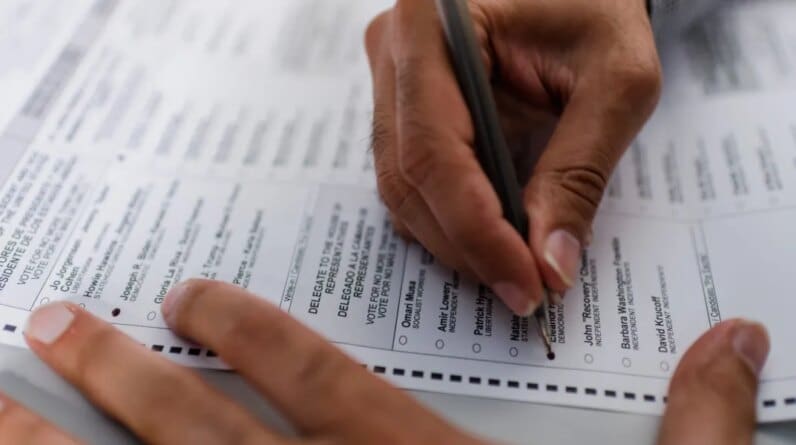
A 35-year-old Texas man legally changed his name to “Literally Anybody Else” and announced he is running in the 2024 U.S. presidential election.
The man, formerly known as Dustin Ebey, is an army veteran and teaches seventh grade math at Watauga Middle School, located in Tarrant County, Texas. But this week, he decided to give the world a history lesson and announced his run for presidential candidacy—which, historically speaking, is a doomed mission—out of frustration over the two repeating candidates, former president Donald Trump and current President Joe Biden.
The name change idea started as a joke last year, Else said in an interview with Texas outlet WFAA. He started taking it seriously because he realized there’s few other options “for folks like me who are just so fed up with this constant power grab between two parties that just has no benefit to the common person.”
Else legally changed his name at a courthouse in Tarrant County on January 12, and it’s even reflected on his driver’s license. But he’ll need 113,000 signatures from non-primary voters in Texas to make it on the presidential ballot. Since it’s unlikely he’ll receive enough signatures, per a Guardian report, he’s campaigning for people to write in his name.
Being on the ballot isn’t about himself as a person, he said in the interview, “it’s about literally anyone else as an idea.”
Else believes there should be an option beyond the two candidates—one a billionaire and the other a lifelong politician—because they don’t share the same experiences as the majority of the country. He questions whether Trump and Biden are “still in touch with people like me or people like you.”
What’s more, Else said a lot of people he speaks to vote “against one of the main candidates rather than for someone they support.” They might not like Biden, he explained, but they’ll vote for him if they despise Trump. He hopes that getting his name on the ballot can be a way for “disenfranchised” people who want another presidential option to say “neither.”
“We should have the option to vote for people who represent us,” Else said, rather than voting for the “lesser of two evils.”
Can third-party candidates actually win an election?
The sentiment behind Else’s presidential bid is not lost on many people. Taste for a third party candidate has been growing. Indeed, 63% of U.S adults agree that the republican and democratic parties do “such a poor job of representing the American people that a third major party is needed,” according to a survey conducted by Gallup in October.
The country is home to more than 54 political parties–some of the most active include The Green Party, Reform Party, Libertarians, and Natural Law Party–and 37 of them have had candidates run for the U.S. presidency. But historically, third party candidates tend to lose because of how the country’s two-party system evolved, according to a report by Third Way, a public policy think tank based in Washington D.C.
Some influential third-party candidates who have run include Ross Perot, who ran as an independent in 1992, and Ralph Nader, who made four presidential bids under the Green Party in 1996 and 2000; the Reform Party in 2004; and as an independent in 2008. They were all unsuccessful runs.
On March 8, No Labels, a group that supports third-party presidential candidates, decided to field a presidential candidate in the 2024 election,The Associated Press reported, but its luck has been dry. Earlier this week, former New Jersey Gov. Chris Christie decided against a third-party run with No Labels, joining a list of other big-name candidates, including Arizona Sen. Kyrsten Sinema, and West Virginia Sen. Joe Manchin who refused to join the centrist party.
While Christie said he appreciates “the encouragement I’ve gotten to pursue a third party candidacy,” and feels as if it’s an important conversation to be had, he thinks it could hurt the overall election outcome. “If my candidacy in any way, shape or form would help Donald Trump become president again, then it is not the way forward,” he wrote in a statement on X.
And the Third Way report also goes to show how third-party runs can affect election results.
It’s “close to impossible for a third-party candidate to actually win the election outright,” and candidates often instead “act as a spoiler,” the report says.
Still, dreams of a more relatable third-party are in motion in much of the country–as seen by Else’s name-altering decision to address the two-party dominated ballot. And he hopes his name on the ballot will be a “beacon for everyone who shares the same sentiment.”







